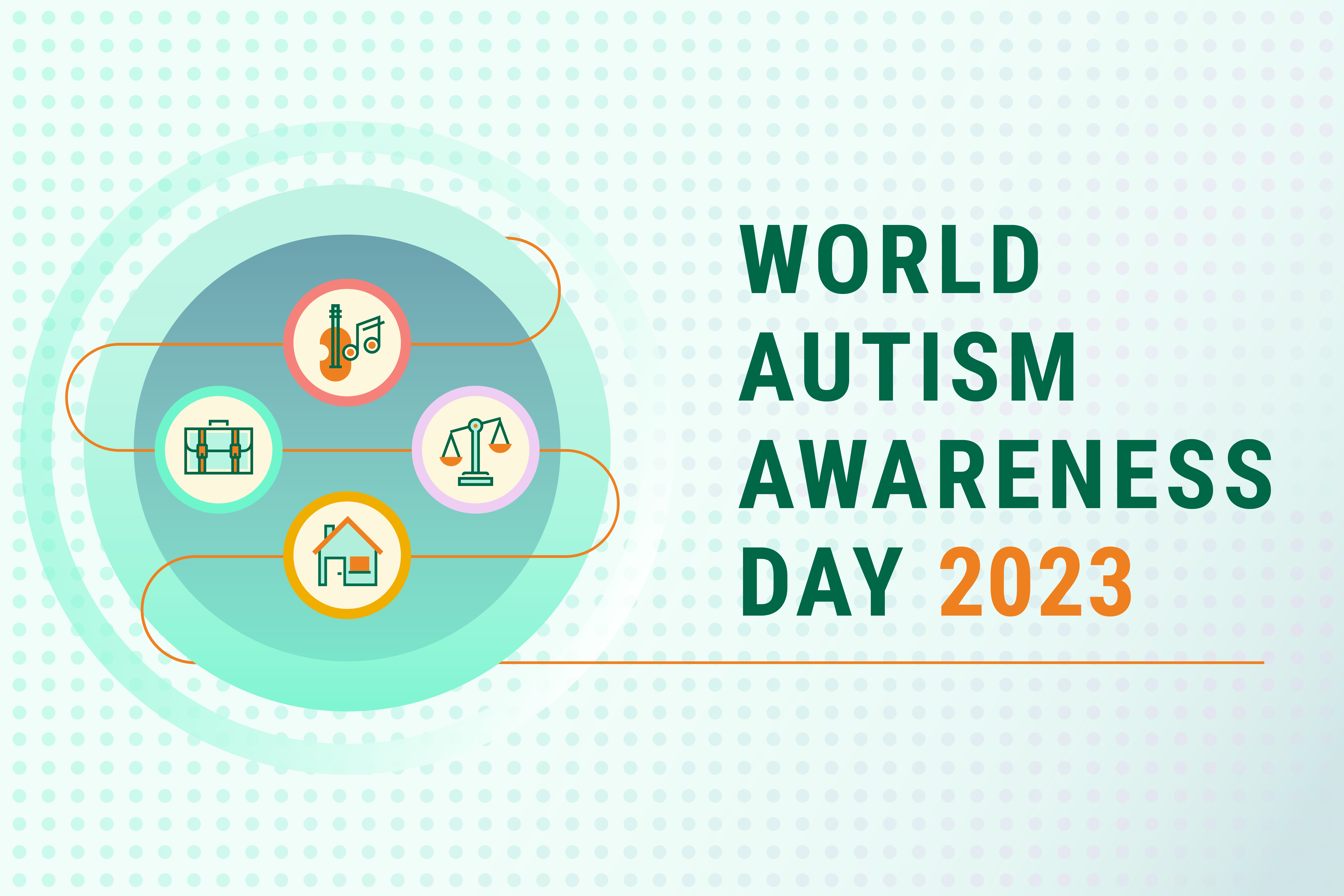The importance of understanding autistic people to better support them
By Kate Allen, Ategi’s Chief Executive Officer
To celebrate World Autism Awareness Day on April 2nd, Kate Allen has written this blog where she shares her experiences of people with autism and explores ways we can better support people with autism through understanding.
Through different support models, Ategi reaches more than 350 adults with additional needs and different diagnoses. In addition to providing personalised support to meet those needs, we want to inform society about the challenges people experience and influence beneficial change; so we made it one of our strategic objectives. There are an increasing number of awareness days/weeks in our year (some might argue too many) that provide an excellent opportunity to share information about conditions and causes that might otherwise not be spoken about. Autism Awareness day (or Autism Acceptance Day as it is often known now) on the 2nd April has proved to be just that as over the course of 15 years the impact of being autistic has become increasingly better known.
Prior to joining Ategi I was the Chief Executive of a charity providing specialist support to autistic adults. Some with very complex needs, distressed behaviours and learning disabilities who professionals had previously said could never live in the community. We proved that wrong – frequently. I worked there for 13 years, 7 as CEO. I also have an adult autistic nephew.
Autism is a developmental disorder that whilst affects people in different ways, they often share similarities in the areas where they experience difficulties. Some autistic people have additional conditions such as a learning disability or mental health condition; others may be highly intellectual but struggle in other areas such as understanding social nuances. You may have heard of the autistic spectrum –and spectrum is a very important word because every autistic person is different.
Perhaps the most well-known trait is that autistic adults like routine, and that changes to routine can cause anxiety and distress. A better way to describe this is that autistic people feel more comfortable with predictability. The world can be a confusing place to an autistic person who doesn’t intuitively understand some of the ways and behaviours of neurotypical humans. Therefore, creating predictability (through routines) alleviates the stress of ‘what is going to happen next’.
A neurotypical person is someone who isn’t autistic or affected neurologically by other conditions such as acquired brain injuries or dementia. And neurotypical people do some odd things that just don’t make sense! At Christmas, we buy someone a gift and then cover it in paper so they don’t know what it is (scary & unpredictable) and we cut down trees to bring them indoors for a few days and put the gifts under it. We say odd things, we say ‘take a chair’ when we are actually suggesting someone sit down, not take the chair. We say ‘I’ll do that in a minute’ when we actually mean we will do it in 10 minutes (or more). These might seem small things, but to an autistic person, it is very confusing.
Autistic people often don’t pick up on the same social cues that intuitively neurotypical people learn as children. They may not associate water coming from the eyes as that person being sad because sometimes that happens when people are happy – and it’s hard to tell the difference. They may miss the tone that indicates if someone is being sarcastic or serious. This can make it very hard for an autistic person to ‘fit in’. Especially as an autistic person will often say what they are thinking (surely being honest is a good thing?) without considering that it might offend or upset the other person.
Autistic people often have sensory sensitivities or difficulties. They may be unable to filter sounds or smells. If just for a moment you stop to consider all the sounds you can currently hear (go on try it! I can hear a radio in the background, birds singing, a light flicking, a fan whirring and a car driving) and now imagine hearing them all at the same volume at once, you might find it overwhelming too. When an autistic person is overwhelmed, they might try to block the noises out by rocking, or concentrating on something else that distracts them or they might become distressed and this is often called a meltdown.
Historically, autism was associated with affecting more boys than girls, however, this is being increasingly challenged. It is recognised that females are better at masking the difficulties they experience and not necessarily deliberately. I have to stray into stereotypical comments here (my apologies) but females may naturally copy what other females are doing. Learning as they grow up what to wear, what is fashionable, watching the tv programmes that most people are watching and behaving as other females do. Autistic females do this well in their attempts to fit in but it is hard work and can be exhausting.
Often autistic people will have interests that dominate their life and their conversations. They are experts in their subjects and will dedicate enormous time to concentrating on their interests. It is this passion, this intense concentration and their ability to think differently that can lead to some amazing outcomes. We should be grateful to many inventors, scientists and campaigners in the past (and present) who were undoubtedly autistic.
There are many coping strategies that can be used to help an autistic person cope with difficult situations. In addition to Ategi being able to provide support and assistance, the National Autistic Society has some excellent online resources. Professional practice (autism.org.uk)

The world can be a confusing place to an autistic person who doesn’t intuitively understand some of the ways and behaviours of neurotypical humans. Therefore, creating predictability (through routines) alleviates the stress of ‘what is going to happen next’.
There are many ways to better support autistic people. Here are some suggestions:
- Educate yourself about autism: Autistic people are often misunderstood because of the many myths and stereotypes that exist about autism. By learning about what autism really is, you can better understand and appreciate the unique experiences of autistic people.
- Listen to and respect autistic people: Autistic people often have unique perspectives and insights that can be valuable to others. Listen to their experiences and respect their preferences and needs.
- Create inclusive environments: Many autistic people experience sensory sensitivities that can make certain environments uncomfortable or overwhelming. Creating inclusive environments that take into account the needs of autistic people can help them feel more comfortable and included.
- Provide coping strategies: Explore sensory tools, flexible schedules, and alternative communication methods can help autistic people navigate social situations and daily life.
- Challenge ableism: Ableism happens when society (intentionally or not) behaves and creates environments that suit able people more than disabled people. Challenge and influence society to create a more inclusive place for autistic and disabled people, rather than expecting autistic people to change to suit society.
- Support autism-led advocacy organisations: Autistic-led organisations are often the best equipped to advocate for the needs and rights of autistic people.
Remember, every autistic person is unique and has their own individual needs and preferences. By listening to and respecting autistic people, we can create a more inclusive and accepting society for all.











About the author
Kate Allen
Kate joined Ategi after seven years as Chief Executive at Autism at Kingswood, a charity and support provider of services to Autistic adults and young people in England.
Driving continuous improvement in the delivery of services is compulsory to Kate who says: “The service we provide directly affects the lives others, therefore every person working in social care has an enormous responsibility to do the absolute best they can to ensure people receiving our services get the highest quality of support possible.”